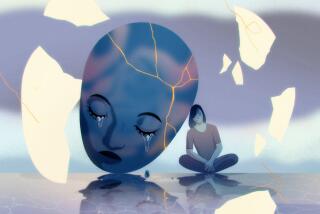WHEN LOVE HURTS
- Share via
Hope Rising (yes, her real name) says that the day she watched her husband pull out of their driveway for the last time, she collapsed, clutching her stomach in pain.
That was, she says, in March 2012, a day before the couple’s seventh wedding anniversary. Rising says she begged him not to go, and after he left, she couldn’t get out of bed for days, though she rarely slept.
“Usually I’d just lie in bed and stare at the wall or the ceiling,” Rising, 47, said. “I was angry that he left, and then I’d think about what I could have done differently for him not to leave.”
Her stomach was constantly in knots, she suffered severe migraines and lived on “coffee, cigarettes and protein shakes.” She lost 60 pounds in two months. Her children -- young adults from a previous marriage -- worried she was suicidal.
Rising’s symptoms were dramatic, but as many people end up learning, heartbreak often causes physical symptoms, said Simon Rego, director of psychology training at Montefiore Medical Center in New York. The human body has a built-in defense mechanism intended to respond to sudden jolts of stress “to keep us alive,” said Rego.
People no longer need that response, called “fight or flight,” to escape the saber-toothed tiger outside the cave, but our bodies still react to physical and emotional threats the way they did during caveman times.
Adrenaline surges through the body. Blood pressure rises, and breathing speeds up. Muscles contract, and the digestive system slows, causing cramping, constipation, diarrhea, nausea or vomiting.
Rising says she didn’t eat for days on end, and when she did, she often vomited 15 minutes later.
“The experience of social rejection may actually have a bodily component to it,” said Ethan Kross, a University of Michigan professor who has studied the effects of physical and emotional pain. “It is more than just a metaphorical feeling of pain around a heartbreak.”
In fact, stress-induced cardiomyopathy, or broken-heart syndrome, is a medical condition in which a person experiences sudden chest pains or believes they’re having a heart attack. The heart temporarily enlarges in response to a surge of stress hormones, according to the Mayo Clinic.
While most of these heart symptoms clear up on their own, it’s important to see a doctor. A breakup is a time when someone is particularly vulnerable to physical illness, said Carole Lieberman, a Beverly Hills psychiatrist and author of the book “Bad Girls: Why Men Love Them and How Good Girls Can Learn Their Secrets.”
Rising’s heart raced for weeks after her husband left, she said, and she then experienced irregular bleeding. It turned out she had benign ovarian polyps that doctors said might have been triggered by stress.
Rising underwent surgery for the polyps, but only after months of regular visits to her therapist did her other physical symptoms begin to subside.
Instead of isolating oneself, Rego said, socializing and seeking support from family, friends and counselors is usually the fastest way to heal.
Return to your normal routine and participate in activities you enjoy, he said.
Rising said therapy helped her gain perspective on what had happened in her marriage and on her devastation afterward.
Rising said it took about six months to take her life back.
She moved. And she began to focus on her health, exercising regularly and joining a meet-up group for people who were recently divorced, and now she finds fulfillment in supporting other men and women who are going through similar loss.
“I gave up so many things to be with this person,” said Rising. “Counseling helped me realize just how wrong we were for each other. Now I’m having a great time rediscovering all the things I like to do.”
For all those feeling lonesome on Valentine’s Day, it’s important to remember that life is never constant, Rego said.
“It’s the blessing and the curse of it all,” he said. “We all will experience loss in our lives. It’s what it means to be human. But as low as we feel, it’s important to remember that things get better.”
And Rising can confirm that. Her current state of mind? Hope rising.
--
--
(BEGIN TEXT OF INFOBOX)
--
You really do feel the pain of loss
If you’re joining in on Lonely Hearts Clubs this Valentine’s Day, the physical feelings of a broken heart may be familiar.
“The idea that people experience pain after rejection may be more than just a metaphor,” said Ethan Kross, an assistant professor of psychology at the University of Michigan who has studied the merger of physical and psychological manifestations after such loss.
In his 2011 study published in the Proceedings of the National Academy of Sciences, Kross found that the areas of the brain that are activated when someone experiences physical pain are the same areas that are affected by emotional loss or heartbreak.
For the study, researchers recruited 40 people who had recently been dumped. (What a job to volunteer for!) Participants underwent MRI scans to measure their brain activity while being shown photos of their exes and while being prompted to remember specific experiences with them.
Then the researchers measured brain activity while the subjects were strapped to a heat source meant to simulate a burning sensation, similar to that of a hot cup of coffee.
They found that in both cases, the secondary somatosensory cortex and the dorsal posterior insula, areas of the brain typically stimulated with physical pain, were activated.
--
Mikaela Conley






